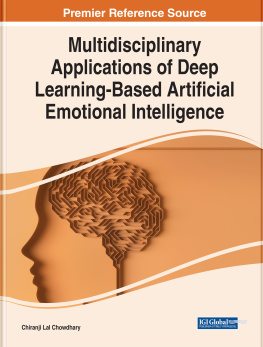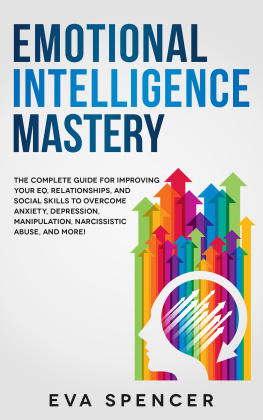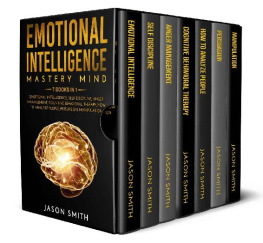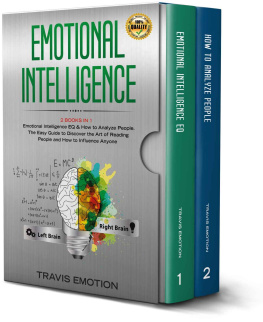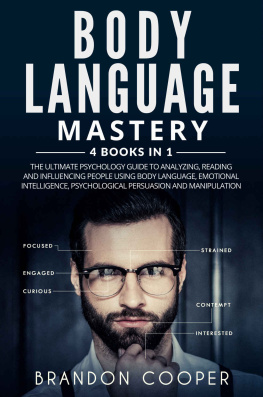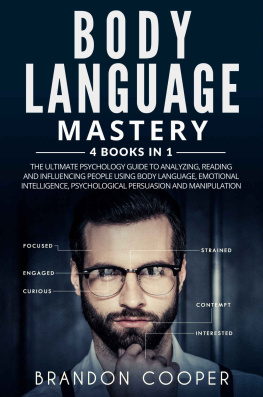Marc Leigh - Emotional Intelligence Mastery: 5 Books in 1: The Art of Reading People, Emotional Intelligence, Accelerated Learning, Manipulation, Daily Self-Discipline (EI Book 6)
Here you can read online Marc Leigh - Emotional Intelligence Mastery: 5 Books in 1: The Art of Reading People, Emotional Intelligence, Accelerated Learning, Manipulation, Daily Self-Discipline (EI Book 6) full text of the book (entire story) in english for free. Download pdf and epub, get meaning, cover and reviews about this ebook. year: 2020, genre: Religion. Description of the work, (preface) as well as reviews are available. Best literature library LitArk.com created for fans of good reading and offers a wide selection of genres:
Romance novel
Science fiction
Adventure
Detective
Science
History
Home and family
Prose
Art
Politics
Computer
Non-fiction
Religion
Business
Children
Humor
Choose a favorite category and find really read worthwhile books. Enjoy immersion in the world of imagination, feel the emotions of the characters or learn something new for yourself, make an fascinating discovery.

- Book:Emotional Intelligence Mastery: 5 Books in 1: The Art of Reading People, Emotional Intelligence, Accelerated Learning, Manipulation, Daily Self-Discipline (EI Book 6)
- Author:
- Genre:
- Year:2020
- Rating:3 / 5
- Favourites:Add to favourites
- Your mark:
- 60
- 1
- 2
- 3
- 4
- 5
Emotional Intelligence Mastery: 5 Books in 1: The Art of Reading People, Emotional Intelligence, Accelerated Learning, Manipulation, Daily Self-Discipline (EI Book 6): summary, description and annotation
We offer to read an annotation, description, summary or preface (depends on what the author of the book "Emotional Intelligence Mastery: 5 Books in 1: The Art of Reading People, Emotional Intelligence, Accelerated Learning, Manipulation, Daily Self-Discipline (EI Book 6)" wrote himself). If you haven't found the necessary information about the book — write in the comments, we will try to find it.
Marc Leigh: author's other books
Who wrote Emotional Intelligence Mastery: 5 Books in 1: The Art of Reading People, Emotional Intelligence, Accelerated Learning, Manipulation, Daily Self-Discipline (EI Book 6)? Find out the surname, the name of the author of the book and a list of all author's works by series.
Emotional Intelligence Mastery: 5 Books in 1: The Art of Reading People, Emotional Intelligence, Accelerated Learning, Manipulation, Daily Self-Discipline (EI Book 6) — read online for free the complete book (whole text) full work
Below is the text of the book, divided by pages. System saving the place of the last page read, allows you to conveniently read the book "Emotional Intelligence Mastery: 5 Books in 1: The Art of Reading People, Emotional Intelligence, Accelerated Learning, Manipulation, Daily Self-Discipline (EI Book 6)" online for free, without having to search again every time where you left off. Put a bookmark, and you can go to the page where you finished reading at any time.
Font size:
Interval:
Bookmark:
Copyright 2020 by Marc Leigh
All rights reserved.
No part of this book may be reproduced in any form or by any electronic or mechanical means, including information storage and retrieval systems, without written permission from the author, except for the use of brief quotations in a book review.

Copyright 2019 by Marc Leigh
All rights reserved.
No part of this book may be reproduced in any form or by any electronic or mechanical means, including information storage and retrieval systems, without written permission from the author, except for the use of brief quotations in a book review.
Have you ever wondered why you can meet a person and just dislike them on the spot or others you just like or feel connected to? Ever wondered how people claim to have fallen in love with a person by just looking at them? Or do you have this colleague that you simply cant stand yet they have done nothing specific to you? Probably you have been struggling to keep relationships and wonder why. What about feeling that you always get it wrong when you meet a person? If you are an employer, perhaps you have asked yourself how do you make sure that you have hired the best person for the job regardless of their academic qualifications?
Maybe there are times you watch a television program especially those related to security and wondered how do they know that the person they have is the perpetrator of the crime, they are convinced yet they dont have concrete evidence and as the events unfold you realize indeed they were right? Do you start wondering what is profiling all about? What about wondering how a psychic is able to tell you things you think no one else knows or things in your past or future? How are they able to read you?
If you have had these and similar questions, then this book is for you. This book will discuss the different personality types that will give you an insight as to why certain people behave the way they do, even yourself, and what areas each personality is best suited to avoid conflicts. You will also learn the different techniques of reading people and how you can use these techniques to get best employees if you are an employer, make a choice of a partner, how different personalities relate and interact as well as the benefits of correctly analyzing others.
This book also discusses the factors that shape an individuals personality, hence, enabling you to understand people better despite their religious, racial, social or academic backgrounds. This book will not only give you insight into how to successfully read people, but it will give you knowledge on how to enhance and build better and healthier relationships with people.
Understanding people may seem not like a big thing but it is very important. You analyze people so that you may understand them and be able to relate to them better. From the academic point of view, it may not be very important but it could be interesting to analyze others. However, from the perspective of life in general, it is more than just analyzing. When we understand ourselves and other people better, it becomes a lot easier and we end up being more successful in dealing with situations and other people and thus, ensuring we get it right.
We look at psychology as an academic discipline but we need to know how we use it to understand personalities which is a more practical subject. This is about using psychology on a daily basis in order to understand them, influence them, support and help them in order for you to get your points across in the best way possible so as to comprehend more and influence decision making, manage and motivate people, for conflict resolution and also to manage and understand our personal influence on other individuals.
It is important to differentiate between the subject of psychology and the subjects of psychology which are the people. Using character analysis, it helps break down different elements into situations that are observable. For instance, you may want to know or may want to understand if a person prefers to hold back and think things through before responding or just speak out, whether they like to start from the beginning or with available possibilities, do they approach situations bluntly or do they have tactical diplomacy? Do they like to relax before doing a job or do the job then relax and so forth. A lot of times it is possible to get it wrong. You may have thought a particular person was extravagant simply because they were outspoken well, in fact, they could be introverted and had been asked a question on a matter that was important to them and they felt passionate about it. It takes practice and with time it is possible to analyze people more correctly.
As human beings, we all practice applied psychology. We have friends and family, we socialize, we may find ourselves in teams and in these different situations, we make decisions concerning people often and often we get it wrong. It is therefore important to get it right when it comes to understanding people since it is more rewarding and avoids many problems.
The Need to Analyze and Understand People
The ability or the skill of understanding other people and being able to predict their behavior, as well as share experiences, is what is known as social cognition. Social cognition is also important in understanding different challenges in daily speech reasons being that people are prone to saying one thing while they mean another. For instance, you may have heard a person claim a place to be hot but what the statement truly means or what the person expects is to have the windows open. This is basically the intention or the meaning behind their remark.
Social cognition, therefore, represents specialized skills in the brain to understand people and are separate the skills needed for non-social tasks like realizing that your dress is dirty or the car is out of gas. This means that social cognition may be affected by brain disorders regardless of the non-social skills which in many cases may remain the same or intact.
Studies have shown that a person with brain damage, especially to the frontal lobe, develop poor social skills as well as interpersonal behavior despite their good intellect. At the same time, autism persons also seem to have inordinate challenges with any social information. With these examples, it can, therefore, be concluded that social cognition could have evolved separately from non-social abilities or skills.
Human beings are social animals that rely on competition and cooperation within groups for their survival. Therefore, their ability to understand social cues as well as understand different social behaviors may be evolutionary and important, hence, the separate development of non-social information skills.
How does it work
Social cognition basically involves you being able to understand the mental states of people by putting yourself in another persons shoes. By doing this, you are able to understand their beliefs, experiences, intentions, and feelings. This enables you to empathize and think through situations from a different point of view. Social cognition also helps us to be able to be more flexible in moving from our own perspective to another perspective. Of interest to note is that social cognition depends on information that may not be observed directly but concluded from information that is incoming and the knowledge we have on the social world.
Font size:
Interval:
Bookmark:
Similar books «Emotional Intelligence Mastery: 5 Books in 1: The Art of Reading People, Emotional Intelligence, Accelerated Learning, Manipulation, Daily Self-Discipline (EI Book 6)»
Look at similar books to Emotional Intelligence Mastery: 5 Books in 1: The Art of Reading People, Emotional Intelligence, Accelerated Learning, Manipulation, Daily Self-Discipline (EI Book 6). We have selected literature similar in name and meaning in the hope of providing readers with more options to find new, interesting, not yet read works.
Discussion, reviews of the book Emotional Intelligence Mastery: 5 Books in 1: The Art of Reading People, Emotional Intelligence, Accelerated Learning, Manipulation, Daily Self-Discipline (EI Book 6) and just readers' own opinions. Leave your comments, write what you think about the work, its meaning or the main characters. Specify what exactly you liked and what you didn't like, and why you think so.

